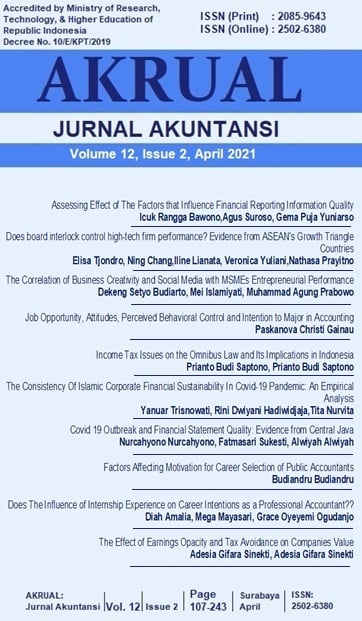The Consistency Of Islamic Corporate Financial Sustainability In Covid-19 Pandemic: An Empirical Analysis
DOI:
https://doi.org/10.26740/jaj.v12n2.p179-192Keywords:
corporate governance, macroeconomics, financial sustainability, covid-19 pandemicAbstract
The concept of sustainability is the ability of a company to carry out work program activities in a sustainable manner to achieve company goals. This study aims to examine empirically the consistency of financial sustainability in Islamic companies before and during the Covid-19 pandemic. To measure the financial sustainability performance, this study used ratios from financial income and financial expenditure. The sample in this study used purposive sampling that is 14 Islamic companies on the Indonesia Stock Exchange. Multiple linear regression and a chow test were used to examine the consistency. The result showed that The financial sustainability ratio of companies at the time of the pandemic has a higher value than before the pandemic. the pandemic period in Indonesia affected the financial stability of companies listed on the Jakarta Islamic Index. The independent variable that affects the dependent variable experiences structural changes in Indonesia in the period 2019 to quarter II of 2020References
Ejiogu, A., Okechukwu, O., & Ejiogu, C. (2020). Nigerian budgetary response to the COVID-19 pandemic and its shrinking fiscal space: financial sustainability, employment, social inequality and business implications. Journal of Public Budgeting, Accounting and Financial Management.
Nuraini, N., S, K. K., & Apri, M. (2020). Data dan Simulasi COVID-19 dipandang dari Pendekatan Model Matematika Akumulasi kasus COVID-19 : Italia.
Satyakti, Y., Budiman, T., & Febrian, E. (2018). Islamic Bank Financial Sustainability: A Micro Econometric Approach. SSRN Electronic Journal, (January). https://doi.org/10.2139/ssrn.3259055
Sk, B. (2019). The Moderating Effect of Depthof Outreach on the Relationship between Financial Leverage and Financial Sustainability of Microfinance Institution. Journal of Economic Business Studies, 2(7).
Spence, M. (1973). Job Market Efficiency. The Quarterly Journal of Economics. 87(3), 355-374.
Sunarko, A. E. S. dan M. R. (2015). Pengaruh Variabel Rasio Keuangan Terhadap Financial Sustainability Ratio Pada Bank Campuran Periode 20011-2013. Eksplorasi, 27(2), 10.
Vintila, Gand Paunescu, R. A. (2016). Empirical Analysis of the Connection between Financial Performance and Corporate Governance within Technology Companies Listed on NASDAQ Stock Exchange. Journal of Financial Studies & Research.
Downloads
Published
How to Cite
Issue
Section
License
Copyright (c) 2021 AKRUAL: Jurnal Akuntansi

This work is licensed under a Creative Commons Attribution-NonCommercial 4.0 International License.
 Abstract views: 1165
,
Abstract views: 1165
, PDF Downloads: 954
PDF Downloads: 954


















